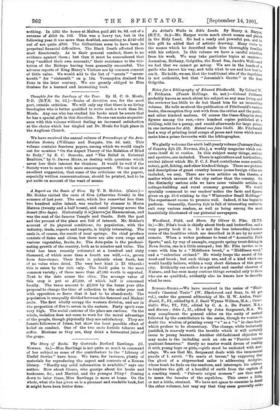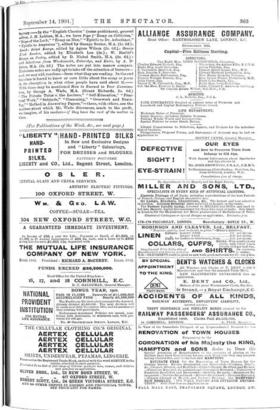SCHOOL-BOOKS.—We have received in the series of "Black - wood's
Classical Texts" (W. Blackwood and Sons, is. acl. per vol.), under the general editorship of Mr. H. W. Auden, Virgil: iEneid, V., VI., edited by S. J. Basil Wynne Willson, M.A. ; Crier: Gallic War, VI., VII., edited by C. A. A. Du Pontet, M.A.; and Horace Odes I., II., edited by John Sergeaunt, M.A. We may compliment the general editor on the unity of method followed by the contributors to the series, though we venture to doubt the wisdom of printing every " v " as a "u" in class-books which profess to be elementary. The change, while technically justified, is scarcely worth the trouble which it will certainly cause to young learners. Another old-fashioned objection we may make is the including such an ode as "Parcius iunctas quatiunt fenestras." Surely no master would dream of reading it with young boys or girls,—girls must be reckoned with now- adays. We see that Mr. Sergeaunt deals with the immemorial puzzle of I. xxviii. "To marls at terrae," by supposing that the ghost of a shipwrecked sailor is addressing ArohYta3, whose tomb he finds on the seashore, and interrupts his address to implore the gift of a handful of earth from the captain of a coasting vessel. " Pulveris exigui munera " are thus made to mean the tumulus of the sepulchre. This seems a little, or not a little, strained. We have not space to examine in detail. the other volumes, but may say that they seem generally eat4' factory. DI the " English Classics" (same publishers), general editor, J. H. Lobban, MA., we have Pope (" Essay on Criticism," "ape of the Lock," "Essay on Man," "Epistle to Dr. Arbuthnot," Epistle to Augustus"), edited.by George Soutar, MA. (2s. 6c1:); jamb: Select Essays, edited by Agnes Wilson (2s. 6d.) ; George Eliot Reader, edited by Elizabeth Lee (2s.) ; W. Haslitt's Rmys en poetry, edited by D. Nichol Smith, MA. (2s. 6d.) ; and Selections from, Wordstvorth, Coleridge, and Keats, by A. D. lanes, 3LA. (2s. 6d.) The notes are put into narrow compass. Elaborate notes are sadly apt to take off-the attention of learners— and, we may add, teachers—from what they are reading. In the end the class is found to knosv or care little about the essay or poem in its absorption in _whet other people have said about it.— With these may be mentioned How to Succeed in Your Examina- tion, by George A. Wade, MA. (Grant Richards, 23. 6d.) "The Private Tritor-VAhe Lecture," " Self-Education," "Prac- tical Work," " Subjects,' "Cramming," "Overwork and Brain- fse" Method in Answering Papers,"—these, with others, are the matters about wMch Mr. Wade discourses, much to the profit, we imagine, of his readers—if they have the root of the matter in
them.







































 Previous page
Previous page